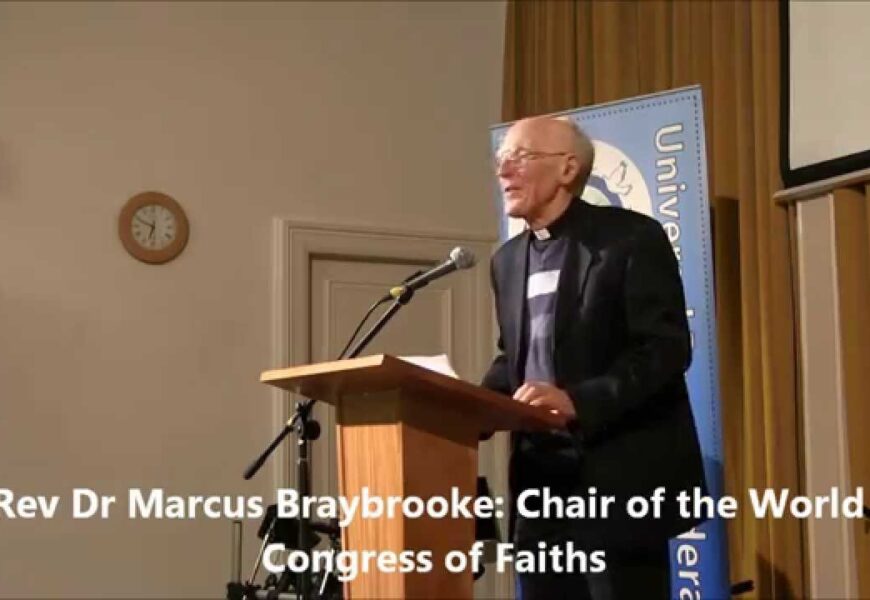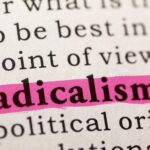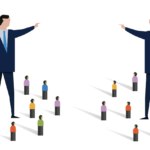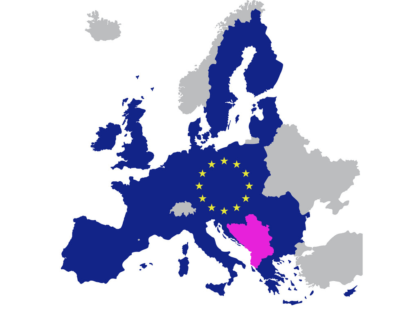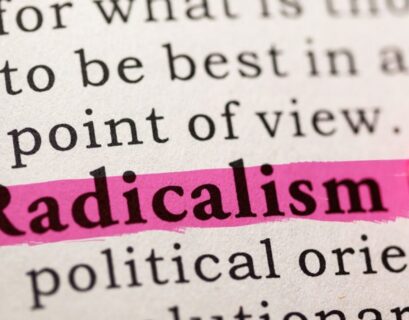By Marcus Braybrooke
On September 11th – that fateful day – a young Muslim from Pakistan was evacuated from the World Trade Centre where he worked. He saw a dark cloud coming towards him. Trying to escape, he fell. A Hasidic Jew held out his hand, saying, ‘Brother, there’s a cloud of glass corning at us, grab my hand, let’s get the heck out of here.’
People of all faiths have condemned that act of terrorism and held hands to support and comfort each other and joined together in prayer. As the young Muslim said afterwards ‘We need to continue to hold hands as we shape a more just and peaceful society.’ Likewise, Kofi Anan, Secretary General of the UN, has said, ‘Nine-eleven made us look with new eyes at each other’s faiths… We need to come together.’
Even so, the world seems a more dangerous place. Although the deadly danger of terrorism is now all too clear, the war against terror has also claimed many innocent lives. The gap between rich and poor grows wider.
The Chinese word for crisis consists I gather of two characters – one of which means Danger and the other Opportunity. In this sense, we are at a critical moment in interfaith relations. It is a time both of danger and opportunity.
The danger is only too evident in the worrying increase in anti-Semitism, Islamophobia and racism, as well as the situations of conflict, especially in Israel/ Palestine and between India and Pakistan. There is alarming, but I believe misguided, talk in some quarters about a clash of civilizations.
Yet the very dangers of the situation emphasize the urgent importance of interfaith understanding and cooperation. Recently the British Foreign Office arranged a Faith and Foreign Policy Week, including a seminar to which a number of religious leaders were invited to meet the Foreign Secretary and some key staff members of the FO. It was another welcome sign that governments recognize the vital importance of encouraging interfaith understanding as a contribution to social cohesion and international peace.
Let me then say a little more about the dangers.
Religion for many people is more a question of identity than a matter of belief. Ask a Christian to define religion and she is likely to say that religion is a matter of belief, particularly of belief in God. But half the world does not think in these terms. For them, religion is first and foremost what you do, not what you think. A Hindu or a Jew must avoid certain foods. What is your religion? It says on the form, that the terrorist asks the same question. Protestant and Catholic in Ulster, Hindu and Sikh in the Punjab… In this sense, religion cannot be quite separated from politics or indeed from racism.1
Because of the important link between religion and identity, although the main causes of a conflict may be political and economic if the antagonists belong to different religions, which differences, and long-remembered injustices, will fuel the bitterness and be used to vilify the enemy. Because of this in the popular mind and maybe the media, the conflict may be spoken of as a religious one or even as ‘a holy war.’ Then the expectation is aroused that ‘religious leaders’ ought to be able to put an end to the conflict: but this is unrealistic.
There are other ways in which religion can be a cause of conflict or add to conflict.
First, Fundamentalism
Fundamentalism, strictly speaking, was a term used at the end of the nineteenth century by Christians who affirmed the verbal inerrancy of the Bible. In a broader sense, fundamentalists, to be found in most religions, are those who reject historical change and claim an absolute truth for their beliefs. This implies that other religions are false.2 It is therefore a religious duty to oppose false teaching and those who try to change traditional beliefs and practices. This is even more the case when it is felt that the undermining of tradition is orchestrated by outsiders.
Let me add that it is misleading to assume that all Muslims are fundamentalist in this modern sense, just because they accept the Qur’an as a direct revelation from God. Muslim scholarship and the development over centuries of Shari’a law allow a considerable variety of interpretations.
Secondly, exclusive claims to the truth encourage people to look down on ‘the heathen’ who do not share them.
The relation of religions to each other has become an important issue for theological debate in most religions. I myself believe that the God of Love whom Jesus revealed is a God who loves all people. We are discovering that religious diversity is enriching and that friendship transcends religious difference. We should rejoice in the truths which we hold dear but learn to appreciate what others treasure. As the Native American spiritual leader Black Elk said, I saw the hoop of my people and I saw that it was holy – and then I saw that it was one hoop of many hoops – all of which are holy. Quite a lot of my writing has been exploring how we can affirm our belief that God’s love has been revealed in Jesus Christ and at the same time respect and learn from other traditions.
Thirdly, religions have too often endorsed the use of violence. Whereas Jesus chose the way of the Cross, the Prophet Muhammad was willing to use force to defend the message of God. Yet although the early Christians were pacifists, more Christians on this point seem to have followed Muhammad rather than Jesus.
What can People of Faith do to reduce Conflict?
I find it hard to see what people of faith can actually do in the midst of war and conflict. In Israel/Palestine, peace activists are virtually prevented from meeting by the respective governments. A chosen few may bravely act as peace messengers. All of us can pray for and call for peace and we can try to ensure that we do not demonize the enemy. It is also important to try to prevent regional conflicts in other parts of the world from damaging community relations in this country.
Religious people can, however, make a major contribution to preventing conflict and to peace-building following a conflict. They have a major preventative task in helping to remove causes of religious hostility. This has been the work of the interfaith movement, which dates back to the World Parliament of Religions, which was held in Chicago in 1893. I have been involved in this work for forty years.
(1) Dispelling ignorance and prejudice – For example, just as Christians have struggled to remove ignorance of Judaism, now there is a lot to do in the West to dispel ignorance about Islam and my small book What Can We Learn about Islam is an attempt to do this. Even between different Christian denominations there is still misunderstanding and I was blessed as a student in the cities to be a member of the United Church of South India.
(2) Encouraging people of different faiths to meet – especially young people. Personal friendship is vital in breaking down false stereotypes. Such personal encounters can be life-changing. In my case, as a student in India, helping at a leprosy clinic with Muslims, Hindus and other Christians helped me see that Christianity has no monopoly on goodness or salvation.
(3) Such a meeting may lead us to rethink our beliefs and recognize that God is active in all the great religions. (4) As the sense of fellowship with people of other faiths develops there is a growing desire to work and discuss and pray together.
Secondly, People of faith can make a valuable contribution to peace-building after conflict.
Where there has been conflict, faith communities have the opportunity to play a healing role. The most striking recent example is South Africa. Desmond Tutu, who chaired the Truth and Reconciliation Commission, has said, ‘We here in South Africa are a living example of how forgiveness may unite people’.3 The example was set by Nelson Mandela. When he was released after twenty-seven years in jail, he declared that his mission was to be the victim and the victimizer. I agree with Desmond Tutu that ‘Without Forgiveness there really is no future’. It also requires courage to apologize, but that too can help to heal division. For religious leaders to call for reconciliation instead of revenge and to affirm the common humanity of oppressed and oppressors requires great courage, but it is the authentic message of all the great faiths.
Thirdly, we need to champion human rights. It is difficult to know when it is right to call for reconciliation and when it is right to confront cruel and immoral misuse of power. Desmond Tutu himself spoke out courageously against apartheid and I believe we should speak out against all abuse of human rights, perhaps especially at present on behalf of the Tibetan and Palestinian people. In 1939, the poet W.H. Auden said, ‘All I have is a voice to undo the folded lie.’4 And at least, in Britain, we have the freedom to protest. The Jubilee 2000 Campaign or the Campaign Against Landmines shows the power of public opinion.
Fourthly, we need to share in creating a more just and peaceful world order. This is the new agenda. The most encouraging development in recent years has been the growing willingness of some politicians, economists and business leaders to take seriously the spiritual and moral dimension of the great problems that face our world. In 1998 a meeting on ‘World Faiths and Development’ was held at Lambeth Palace, London, jointly chaired by James D Wolfensohn President of the World Bank and by Dr George Carey, the Archbishop of Canterbury. From this emerged the World Faith Development Dialogue. In December with the Chief Rabbi and the Muslim leader Dr Zaki Badawi, I was asked to speak to the new Commission on Globalization which the State of the World Forum is establishing.
This suggests that if the faiths are willing to speak together then their contribution to building a new world order will be welcome. I have never felt that interfaith dialogue is just an internal matter of interest to those who happen to be religious. It is I believe vital for the health of a society and for the world community. Only if a new world order is based on the ethical values shared by the great religions will we create a world society of justice and peace in which no one is hungry and in which the environment is treated with reverence.
Soon after September 11th, I had an Email from someone I did not know. He said that after he heard the news of the attack on the Twin Towers he went home and gathered the family together. Then he opened the post which had brought him a copy of the book of prayers which I had edited called “Bridge of Stars”. Let me read the prayer at which he opened the book and on which he tried to focus during that terrifying afternoon. It has a message for us all.
“Friendship to all I give friendship to all, and enmity to none. Know that violence is the root cause of all miseries in the world. Violence, in fact, is the knot of bondage.
Do not injure any living being.
This is the eternal, perennial and unalterable way of spiritual life.
A weapon, however powerful it may be, can always be superseded by a superior weapon; however, no weapon can be superior to non-violence and love”.5
By mutual respect and understanding and by working together, we can offer the world a message of hope that love is stronger than hatred and that unity with God’s grace, can overcome division.
Dr Marcus Braybrooke, Vicar of the Baldons, near Oxford, is President of the World Congress of Faiths, Patron of the International Interfaith Centre and Co-Founder of the Three Faiths Forum.
________________________________________________________________________________________________________
1 R. Gombrich, ‘What Kind of Thing is Religion? in Shap Handbook on World Religions in Education, Commission for Racial Equality, 1987.
2 See further my article ‘Interfaith Can Save Religion for the World in Faith and Freedom, Vol. 52, No 149, Autumn and Winter 1999, pp. 125-133 and Leonard Swidler, The Meaning of Life at the Edge of the Third Millennium, Paulist Press 1992.
3 Desmond Tutu in Exploring Forgiveness, Ed Robert D. Enright and Joanna North, University of Wisconsin Press, 1998, p .xiii
4 W.H. Auden’s poem ‘September 1, 1939, published in 1940. The poem includes the line ‘We must love one another or die.
5 A Jain Prayer, from Bridge of Stars, Ed Marcus Braybrooke, Duncan Baird 2001.


